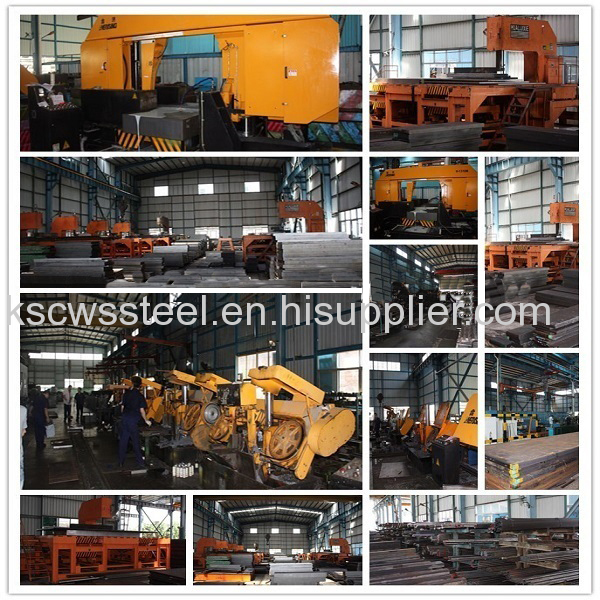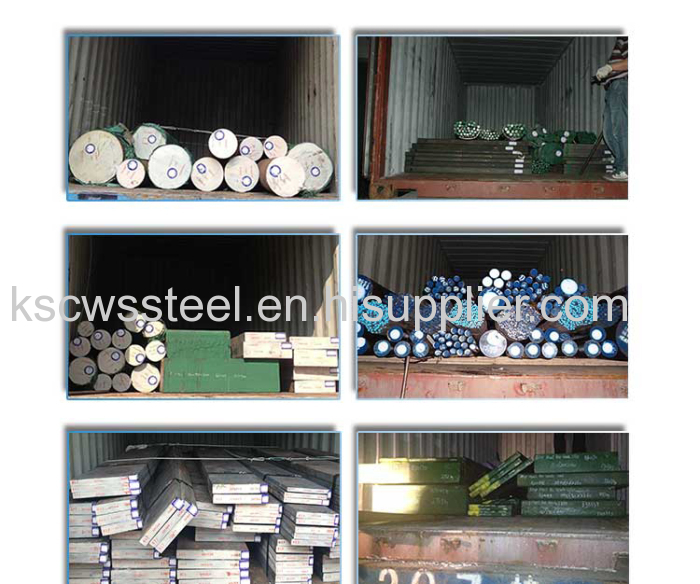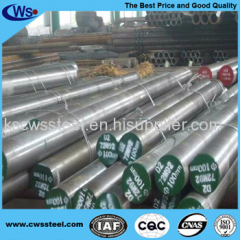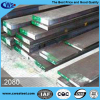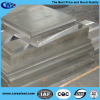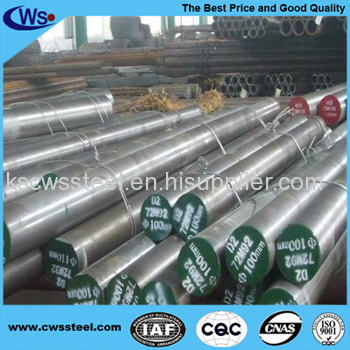1.2379 Cold Work Mould Steel
Introduction:
D2 is a high carbon - high chromium air hardening tool steel, heat treatable to 60-62 Rc. D2 offers excellent wear and abrasion resistance, due to large volumes of carbides in the microstructure. D2 is widely used in long production cold work applications requiring very high wear resistance and high compression strength. It is machinable in the annealed condition, and, like other air hardening tool steels, exhibits minimal distortion in heat treat. D2 is available in de-carb free rounds, flats, and squares, as well as ground flat stock and drill rod.
Applications include:
Typical applications for D2 tool steel are blanking, forming, and trim dies, gages, slitting cutters, wear parts, lamination dies, thread rolling dies, drawing dies, rotary cutting dies, knurls, bending dies, gages, shear blades, burnishing tools, rolls, machine parts, master parts, injection screw and tip components, seaming rolls, extrusion dies, tire shredders, scrap choppers, etc.
Forging:
Heating for forging must be done slowly and uniformly. Soak through at 1850°-1950°F and reheat as often as necessary, stopping work when the temperature drops below 1700°F. After forging, cool slowly in lime, mica, dry ashes or furnace. D2 should always be annealed after forging.
Annealing:
Heat slowly to 1550°-1600°F, hold until entire mass is heated through, and cool slowly in the furnace (40°F per hour) to about 1000°F, after which cooling rate may be increased. Suitable precautions must be taken to prevent excessive carburization or decarburization.
Stress relieving:
When desirable to relieve the strains of machining, heat slowly to 1050°-1250°F, allow to equalize, and then cool in still air (Strain Relieving).
Preheat prior to hardening:
Preheat slowly to 1350°-1450°F and hold at this temperature until material is uniformly heated.
Hardening:
After thorough preheating, heat to 1800°-1850°F. Hold the work piece at the hardening temperature until it is completely and uniformly heated.
Quenching:
D2 is an air hardening steel and will develop hardness on cooling in still air. To avoid scaling and prevent decarburization of the work piece surface, controlled atmosphere or vacuum furnaces are recommended. If these furnaces are not available, pack hardening, salt baths or wrapping the piece in stainless steel foil will provide some degree of surface protection in the hardening process. Parts should be allowed to cool to 150F, or to where they can be held in the bare hand, and then temper immediately.
Tempering:
The tempering temperature may be varied
Equivalent grades | GB | DIN | AISI | JIS | BS | ||||||||
Cr12Mo1V1 | 1.2379 | D2 | SKD11 | BD2 | |||||||||
Chemical Composition | C | Si | Mn | Cr | P | S | V | Mo | Other | ||||
1.50-1.60 | 0.10-0.40 | 0.15-0.45 | 11.50-12.50 | 0.03MAX | 0.03MAX | 0.90-1.10 | 0.60-0.80 | - | |||||
Available size | Round Bar | Diameter | Length | ||||||||||
60-800mm | 2000-6000mm | ||||||||||||
Flat Bar | Thickness | Width | Length | ||||||||||
25-400mm | 200-800mm | 2000-6000mm | |||||||||||
Surface condition | Black surface/ Grinded/ Machined | ||||||||||||
Annealed hardness | HB225MAX | ||||||||||||
Characteristics | Very high resistance against abrasive and adhesive wear due to a high volume of hard carbides in the steel matrix | ||||||||||||
Applications | Shear blades,Thread rolling dies,Drawing and bending tools | ||||||||||||
Heat treatment | Hardening | ||||||||||||
100°C | 200°C | 300°C | 400°C | 500°C | |||||||||
63 | 61 | 58 | 58 | 59 | |||||||||
Mechanical properties | Density | 7.7[g/cm3] | |||||||||||
Thermal Conductivity | 20.20 W/(m/k) | ||||||||||||
Specific heat capacity[J/g.K] | 0.46 | ||||||||||||
Coefficient of Linear Thermal Expansion 10-6 oC-1 | |||||||||||||
20-100°C | 20-200°C | 20-300°C | 20-400°C | 20-500°C | |||||||||
